 | In charge of making sure the country has enough energy, from gas for our cars to oil for heating our homes. Some of its agencies:
- FERC: The Federal Energy Regulatory Commission.
- DOE also manages nuclear testing facilities.
- Bill Richardson served as Bill Clinton's Energy Secretary from 1998-2000.
|
 | The Justice Department is in charge of investigating crimes and enforcing federal law, including civil rights laws that guarantee Americans equal opportunity regardless of race. Its agencies include:
- DEA: The Drug Enforcement Agency
- FBI: The Federal Bureau of Investigation
- INS: The Immigration and Naturalization Service
- Janet Reno served as Bill Clinton's Attorney General from 1993-2000.
|
 | Responsible for ensuring fair wages, a safe workplace and equal opportunity.
- BLS: The Bureau of Labor Statistics keeps track of the state of the American workforce, including the unemployment rate.
- OSHA: Occupational Safety and Health Administration.
- Robert Reich served as Bill Clinton's Labor Secretary from 1993-1997.
|
 | Commerce tries to make sure businesses and industries run well and can sell things overseas. Some of its agencies:
- Census2000: The department also runs the Census Bureau.
- NOAA: The National Oceanic and Atmospheric Administration.
- NWS: The National Weather Service (part of NOAA).
- USPTO: The Patent and Trademark Office.
|
 | The CIA is an independent agency. THe Director may gain cabinet status as a result of the 9/11 Commission report.
|
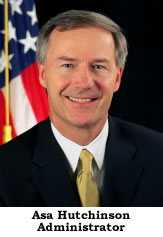 |
Asa Hutchinson
(Former Administrator of the Drug Enforcement Agency) 2001 Budget: $1.6 billion; total federal drug budget $18.2 billion
DEA is a sub-cabinet agency in the Department of Justice. The administrator is not the Drug Czar -- that is a separate post, formally called the Director of the ONDCP:, but it also is not in the Cabinet. Hutchinson became the Undersecretary of Homeland Seceurity, a post he resigned in January 2005.
|
 |
Mel Martinez
(Retired 2004 to run for Florida Senator -- replaced by Alphonso Jackson -- new page coming after the election!)
(Secretary of Housing and Urban Development) 2001 Budget: $28.5 billion
HUD tries to make sure there are enough homes for people who donít have a lot of money. It also helps enforce equal-opportunity housing laws, so that people wonít be discriminated against when they try to move into a new neighborhood.
- Andrew Cuomo served as Bill Clinton's HUD Secretary from 1997-2000.
|
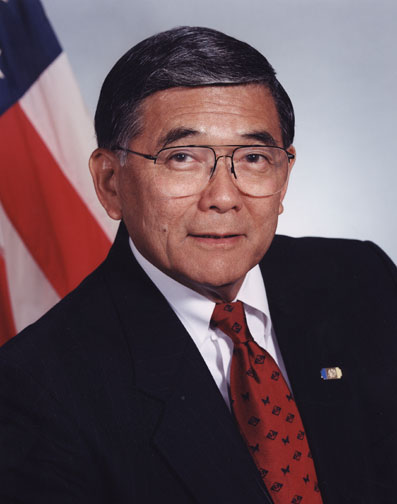 | DOT keeps an eye on the airlines, patrols the waterways, helps build and maintain highways, and regulates motor vehicles and promotes traffic safety.
- FAA: Oversees the Federal Avaiation Administration, resposible for air traffic.
- The Interstate Highway System is built and maintained by DOT.
- Norman Mineta also served as Bill Clinton's Transportation Secretary from 2000-2001.
|
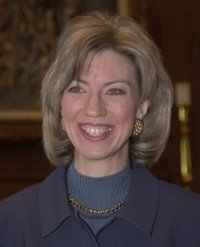 | Responsible for protecting the nationís natural landscape, and making sure people and companies have the proper access to it. It also handles:
- NPS: The National Park Services, which operates parks, rivers, & monuments.
- BLM: The Bureau of Land Management, which overseas federally-owned land.
- USGS: The U.S. Geological Survey, which is a science agency for mapping and data collection.
- BIA: The Bureau of Indian Affairs, which deals with all Native American issues.
|
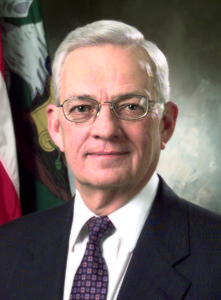 |
Paul O'Neill
(Retired Jan. 2003 and wrote The Price of Loyalty; replaced by John Snow -- new page coming after the election!)
(Treasury Secretary) 2001 Budget: $14.0 billion
The Treasury Department prints U.S. currency and collects it at tax time. Some Treasury agencies:
- IRS: The Internal Revenue Service.
- Customs Service: controlling incoming people and goods.
- The Mint: where currency, coins, and stamps are produced.
- The Secret Service which protects the President and other officials.
- ATF: The Bureau of Alcohol, Tobacco, and Firearms.
|
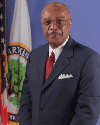 | Distributes federal money for college loans and scholarships, and funds programs to improve the education of grade school and high school kids, especially those from low-income families.
- Lamar Alexander served as George Bush Sr.'s Education Secretary from 1991-1993.
|
 | Handles foreign policy and sends out foreign service officers.
- Runs U.S. embassies, to assist U.S. travelers abroad.
- Also runs USIA, the US Information Agency, to disseminate information abroad.
|
 | The VA now manages hospitals for veterans and gives support to Americaís 25 million veterans and their families.
|
 | The National Security Council is an Executive Office (not a Cabinet department).
- The National Security Council is the President's principal forum for considering national security and foreign policy matters with his senior national security advisors and cabinet officials. Since its inception under President Truman, the function of the Council has been to advise and assist the President on national security and foreign policies.
|
 | The "Terrorism Czar" is a Cabinet-level position, but not a Cabinet department.
- Coordinates a comprehensive national strategy to safeguard our country against terrorism, and responds to any attacks that may come.
- The office was created on Sept. 20 2001 by Pres. Bush in response to the World Trade Center attack.
- The Terrorism Czar Richard Clarke was not Ridge's predecessor -- Clarke's title was National Coordinator for Security and Counter-Terrorism and he served under Condoleezza Rice on the National Security Council. Clarke wrote the 2004 book Against All Enemies.
|
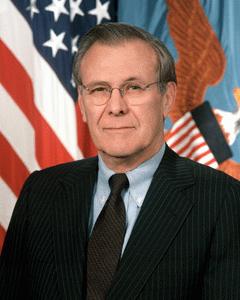 | Defends the nation and, sometimes, the things it cares about in other countries. The Defense Department is headquartered in the Pentagon and is in charge of the U.S. Armed Forces.
- JCS: Joint Chiefs of Staff from the Army, Navy, Air Force and Marine Corps.
- DARPA: The agency that initiated the Internet.
- Dick Cheney served as George Bush Sr.'s Defense Secretary from 1989-1993.
- Sen. William Cohen (R, ME) served as Bill Clinton's Defense Secretary from 1997-2001.
- Donald Rumsfeld also served as Gerald Ford's Defense Secretary from 1975-1977.
|
 | Protects the health and well-being of Americans. HHS is in charge of Medicare (which provides health insurance to older and disabled Americans) and Medicaid (which helps provide insurance to low-income citizens). Its other agencies include:
- FDA: The Food and Drug Administration
- NIH: National Institutes of Health.
- CDC: The Centers for Disease Control and Prevention.
- AFDC: Aid to Families with Dependent Children (the welfare program).
|
 | The Department of Agriculture, or USDA, monitors the safety and quality of meat, eggs and poultry.
- USFS: The U.S. Forest Service is run by USDA, because forests were then considered primarily an agricutltural resource.
- NRCS: Natural Resource Conservation Service (formerly Soil Conservation Service).
- USDA also runs the food stamp program and the national school lunch program.
|
 | The EPA is technically not in the Cabinet, but is a "Cabinet-level agency." EPA is responsible for promulgating and enforcing environmental regulations.
|
|
Independent AgenciesNumerous federal agencies are not directly supervised by any Cabinet department. These include:
- ACE: Army Corps of Engineers (2001 budget: $4.5 billion)
- CIA: Central Intelligence Agency (1998 budget: $26.7 billion)
- CBO: Congressional Budget Office
- EPA: Environmental Protection Agency
- FCC: Federal Communications Commission
- FDIC: Federal Deposit Insurance Commission
- FEC: Federal Election Commission
- FEMA: Federal Emergency Management Agency (2001 budget: $2.4 billion)
- Federal Reserve: The agency headed by Alan Greenspan which sets interest rates.
- FDA: Food and Drug Administration
- LSC: Legal Services Corporation (2001 budget: $0.3 billion)
- NASA: National Aeronautics and Space Administration (2001 budget: $14.3 billion)
- NEA: National Endowment for the Arts (2001 budget: $0.1 billion)
- NEH: National Endowment for the Humanities (2001 budget: $0.1 billion)
- NRC: Nuclear Regulatory Commission
- NSF: National Science Foundation (2001 budget: $4.4 billion)
- Peace Corps: overseas volunteer service
- SEC: Securities and Exchange Commission
- SBA: Small Business Administration (2001 budget: $0.3 billion)
- Smithsonian: National Museum (2001 budget: $0.5 billion)
- SSA: Social Security Administration (2001 budget: $6.0 billion)
- USAID: U.S. Agency for International Development
- USITC: U.S. International Trade Commission
- USPS: U.S. Postal Service
- (2001 discretionary budget for all other agencies not detailed above totals $11.7 billion. Note that mandatory spending is not included in budget figures. Total of all discretionary spending for FY 2001 is $661.6 billion.)
|
|
Executive AgenciesSome additional federal agencies are overseen directly by the Executive branch:
- NSA: National Security Agency
- NSC: National Security Council
- OMB: Office of Management and Budget, the President's counterpart to Congress' CBO.
- ONDCP: Office of National Drug Control Policy
- USTR: Office of U.S. Trade Representative
|
|
Source for budget figures: US Budget FY 2002 Presidential Request, Table S-6, Discretionary Budget Authority by Agency. Note that mandatory spending is not included in budget figures.
|














